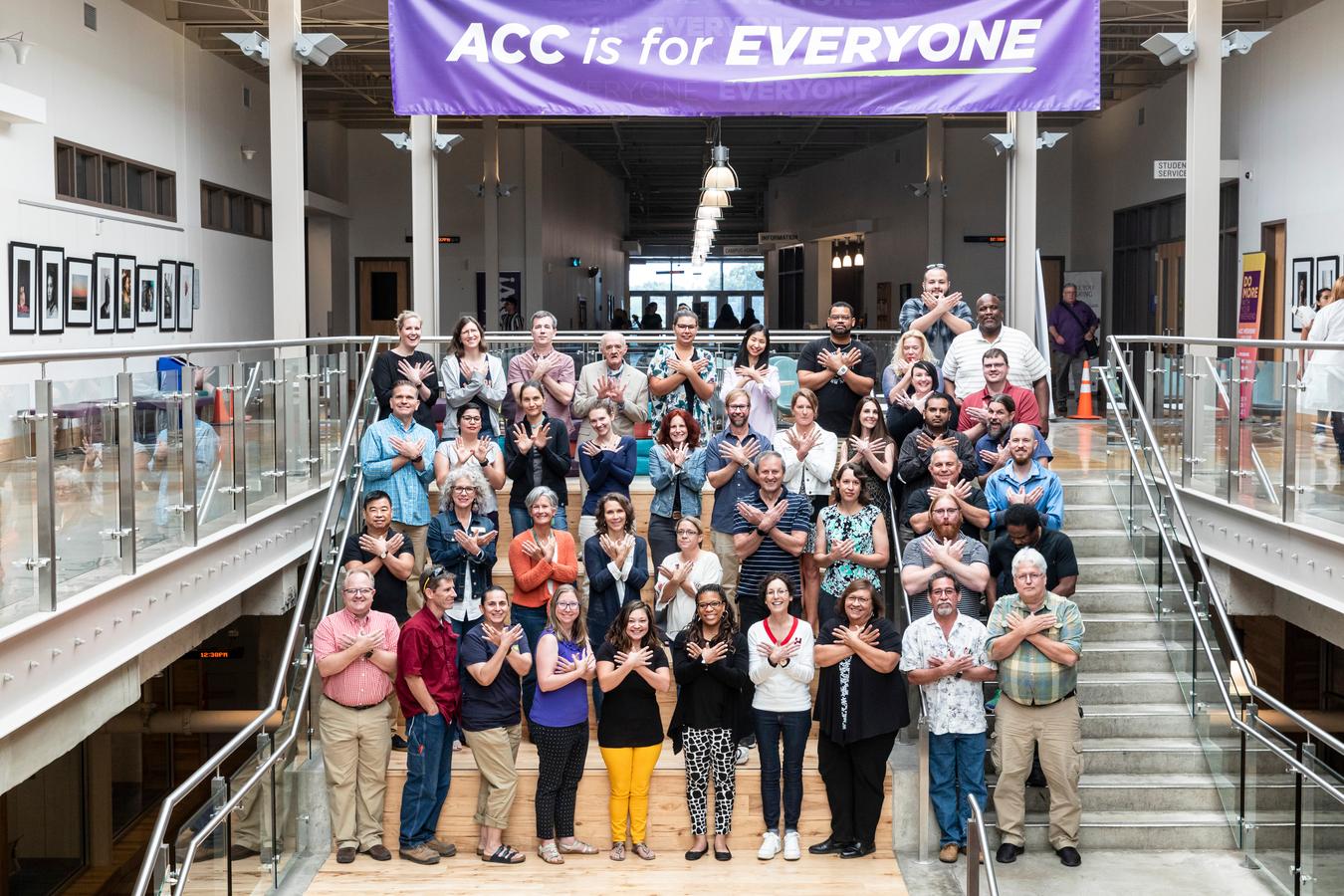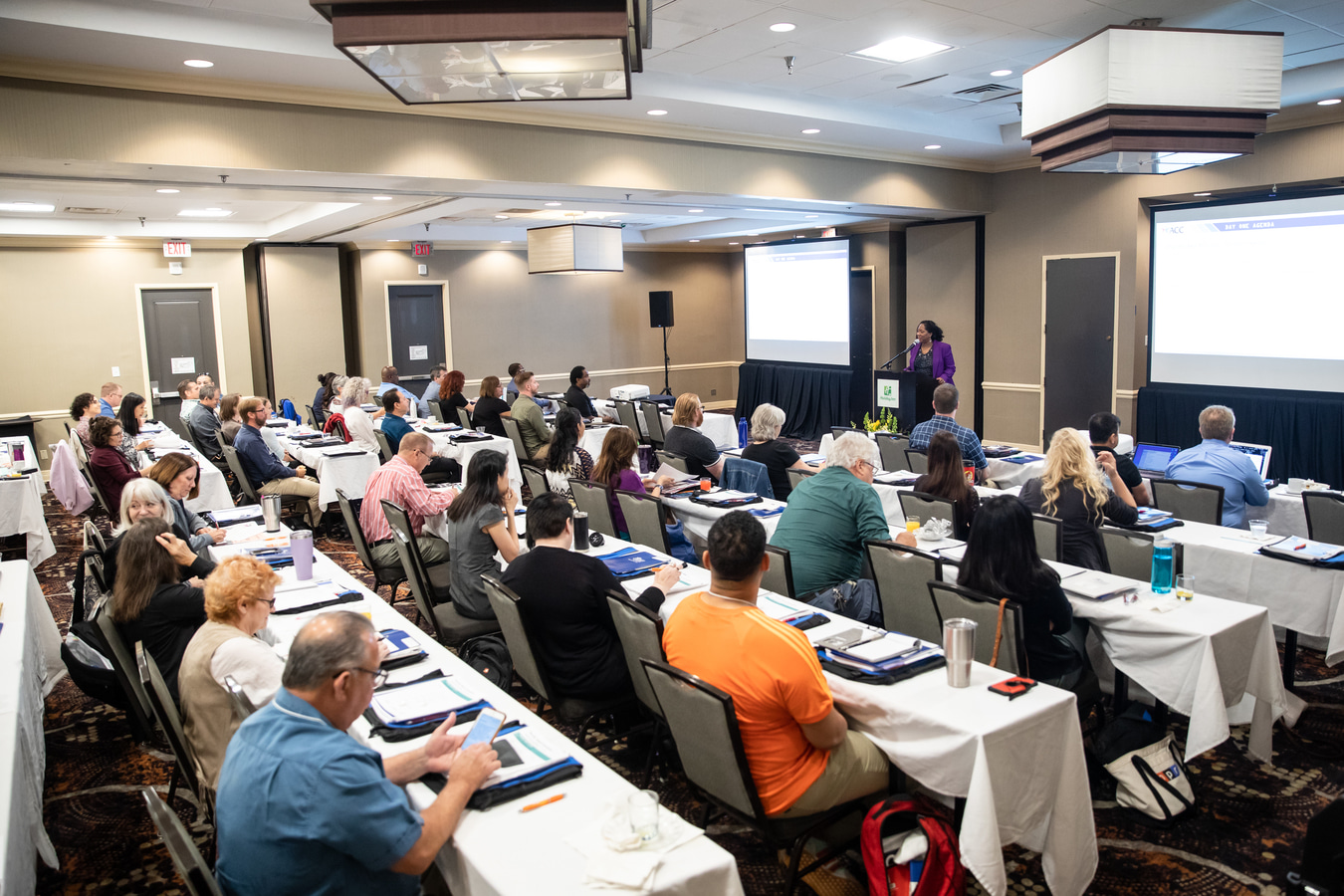Fall faculty first to undergo new hiring and onboarding processes

Changes have been made to ACC's faculty hiring and onboarding processes to help align with the college's strategic plan and, ultimately, improve student success. The 43 full-time faculty members hired this fall were the first to undergo the new processes.
REDESIGNED HIRING PROCESS
"Hiring faculty is the most important thing that we do to support student success," says Dr. Gaye Lynn Scott, Academic Programs associate vice president. "Here at ACC, we've spent the last year working intentionally to embed an equity framework into our faculty hiring processes."
The revised hiring process originated from an institute on equity in faculty hiring put on by the Center for Urban Education that a small cohort of ACC employees attended in spring 2018.
"We returned home with a toolkit and plans for reinventing our faculty hiring processes to put equity front and center," says Scott, who was part of the team that attended the institute. "We made a report to the President's Cabinet in summer 2018 and were charged with establishing an Equity in Faculty Hiring Steering Committee and launching the equity hiring lens by September 2018 when full-time faculty positions would be posted."
The Equity in Faculty Hiring Steering Committee was chaired by Scott; Gerry Tucker, vice president of Human Resources; and Dr. Suzanne Summers, History professor. The committee included instructional deans Dr. Lorlie Ellis, Business, and Dr. Sam Echevarria-Cruz, Liberal Arts - Social & Behavioral Sciences; department chairs Carolynn Reed - Math; Jose Milan - PT Assistant; Theresa Glenn - Communication Studies; Troy DeFrates - Welding; Samantha Ackers, 2018-2019 Adjunct Faculty Association president; Yam Tolan, 2018-2019 Faculty Senate president; Erica Breedlove, HR; Dr. Stephanie Hawley, former associate vice president of the Office of Equity and Inclusion who recently left ACC; and Dr. Chantae Recasner, Faculty & Instructional Development dean.
New hiring committees were required to diversify by including a faculty member outside of the program to serve on the committee, for example, and all hiring committee members participated in three hours of equity and diversity training.
Below is a summary of other aspects of the redesigned hiring process:
- Job postings were rewritten to describe who we are, whom we serve, and whom we want to join us.
- Full-time faculty jobs were posted and advertised for 90 days to build a rich, deep, and broad applicant pool.
- Each applicant was asked to submit not only a letter of interest and a CV, but also a statement of teaching philosophy and an equity statement.
- The "preferred" qualifications in academic transfer postings that often became de facto required qualifications and served as a means of inequitably reducing the applicant pool were eliminated.
- Hiring committees were offered sample equity-minded interview questions and an equity-minded summative evaluation rubric.
- Hiring committees were encouraged to conduct two rounds of interviews, the first via Skype or Zoom with a wide range of candidates, and the second in person with the finalists.
Out of the 43 new faculty hired, 22 were former adjuncts and 15 did not identify as White.
"Modifications to processes and timelines are being made for the second year based on what we learned this first year," says Scott. "We also want to establish a more intentional equity-minded focus for adjunct faculty hiring in 2019-2020."

NEW FACULTY ONBOARDING PROCESS
In addition to revamping the hiring process, a new onboarding process was created to help acquaint new faculty to the college and its strategic goals.
The process was recommended in a report from a 2018 faculty task force initiated by Mike Midgley, vice president of Instruction.
"We partnered with Human Resources to recreate the way faculty onboarding looks," says Michelle Fitzpatrick, Faculty Development assistant dean. "As a part of the task force work we asked, 'What do faculty need to know the first day of class to be successful?'"
The faculty-led, faculty-driven onboarding process starts with three days of orienting new faculty to ACC, including hands-on training in creating their syllabus, developing their course in Blackboard, connecting with faculty and student success departments, resources, and more.
"There were former adjunct faculty in this training that have worked at the college for decades who told me that this has been the most valuable training they have done," says Fitzpatrick.
Onboarding continues throughout the fall semester with a workshop each month that provides valuable information for faculty to feel confident in their role, have the tools needed to be successful, and allows them to connect and learn from one another.
More information on these sessions can be found here.